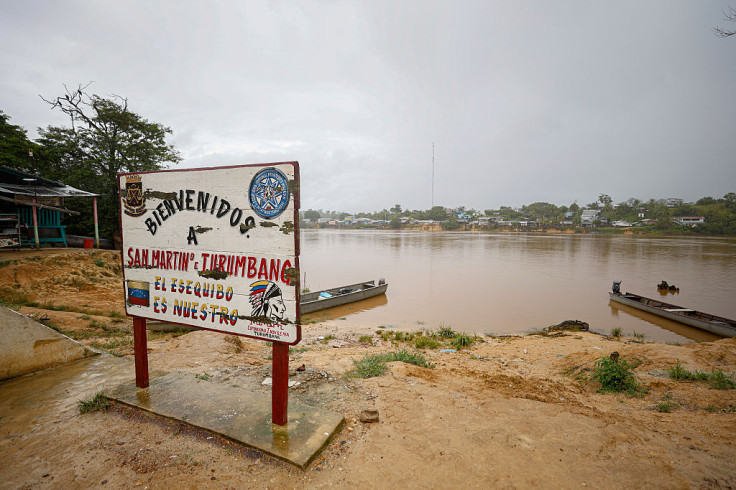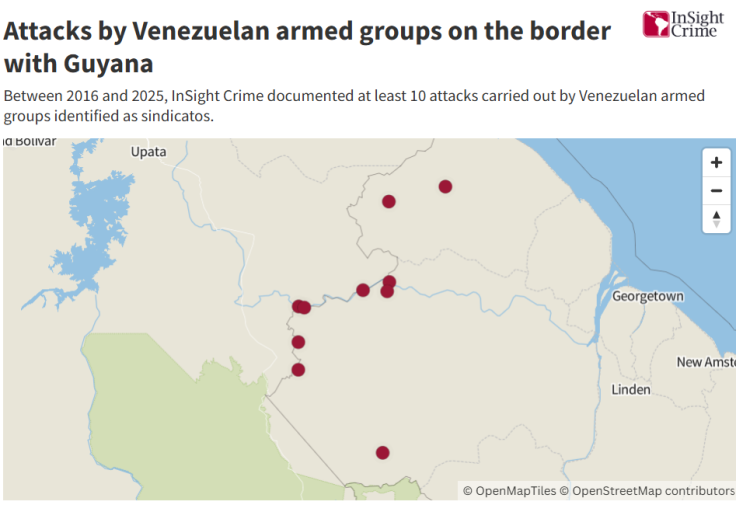
Last month, Guyana's armed forces reported an attack by Venezuelan criminal groups attempting to cross the border and establish operations in the country's Essequibo region — a vast, mineral-rich territory known particularly for its gold deposits that the Nicolás Maduro regime declared part of Venezuela by law in 2024 following a national referendum.
Tensions in the region are escalating as Venezuelan criminal groups known as "sindicatos" attempt to entrench themselves in Guyana. These groups, which control illegal mining in Venezuela's Bolívar state, have reportedly gained power along the border with the support of Maduro's government.
According to an investigation by InSight Crime, the ongoing clashes between criminal groups and Guyana's armed forces could escalate into a broader geopolitical conflict in South America. The outlet noted that the Essequibo's mineral wealth could become a "strategic asset" for the Maduro regime, as it faces declining support both domestically and internationally.
In late May, Maduro called for provincial and local elections that controversially included the Essequibo region, a move widely seen as an effort to legitimize Venezuela's claim to the area.
By calling elections in Essequibo, Maduro aimed to "stir nationalist sentiment and gain support for his government," said Benigno Alarcón, director of a research center at Andrés Bello Catholic University in Caracas, to The New York Times.
Voters in Venezuelan towns near the Guyana border elected Admiral Neil Villamizar as governor of the region. According to InSight Crime, Villamizar was promised "full budgetary support" by Maduro.
Villamizar, running under the ruling United Socialist Party of Venezuela (PSUV), won the election with 4,720 votes — 97.2% of the total votes counted — from a turnout of just 31.58%, The Associated Press reported.
Venezuelan sindicatos
Investigations indicate that Maduro has cultivated "deep alliances" with these sort of groupsin recent years by granting them impunity for both domestic and cross-border criminal activity. So far this year, two attacks on members of the Guyana Defense Force (GDF) have been reported in Essequibo.
Between 2016 and 2025, at least 10 attacks were carried out by armed Venezuelan groups identified as sindicatos, according to InSight Crime.
"We can't say for sure who is running what or who is doing what over there," a senior Guyanese government official told InSight Crime in a September 2024 interview, speaking on condition of anonymity.
The report says these groups exert control over artisanal mining by imposing an informal tax system and taking a percentage of the miners' gold output.
Additionally, an increasing number of Venezuelan nationals have recently been seen at illegal checkpoints along the Cuyuní River, where 70% of the attacks against the GDF have occurred since 2016.

Seven of the 10 attacks documented by InSight Crime since 2016 took place along the Cuyuní River. The outlet reports that criminal cells have set up illegal river checkpoints, where they extort boats carrying passengers and goods, often with the complicity of Venezuelan military personnel.
"There have been a number of miners who have been robbed along the roadway coming out with their production and killed, as well as a number of mining camps that have been ambushed in the interior," a Guyanese mining activist told InSight Crime, also speaking anonymously due to safety concerns.
The longstanding territorial dispute between Venezuela and Guyana was referred to the International Court of Justice by the United Nations in 2018. The ICJ has overseen the case since then, with hearings on the merits ongoing and a final ruling likely still years away.
© 2025 Latin Times. All rights reserved. Do not reproduce without permission.







